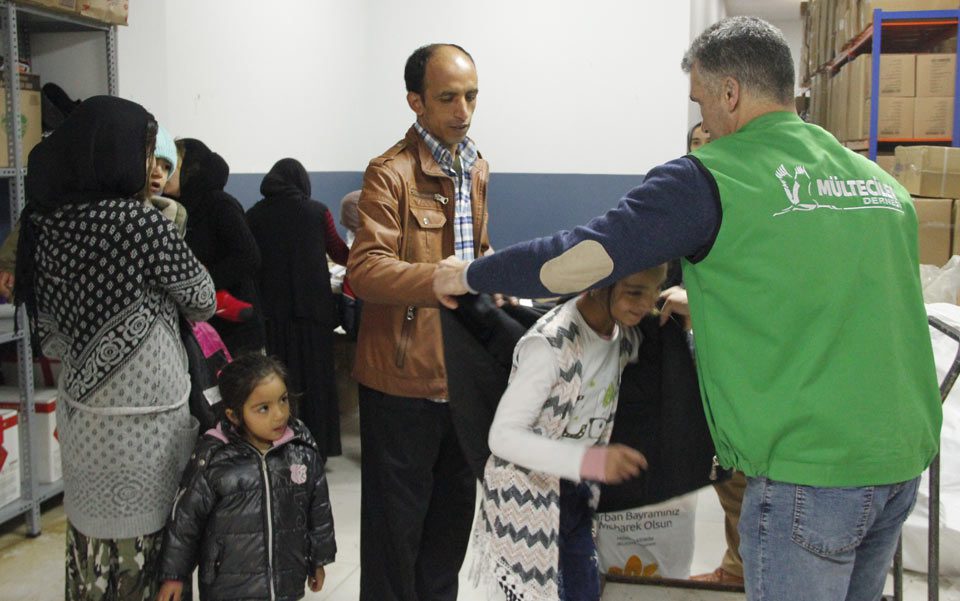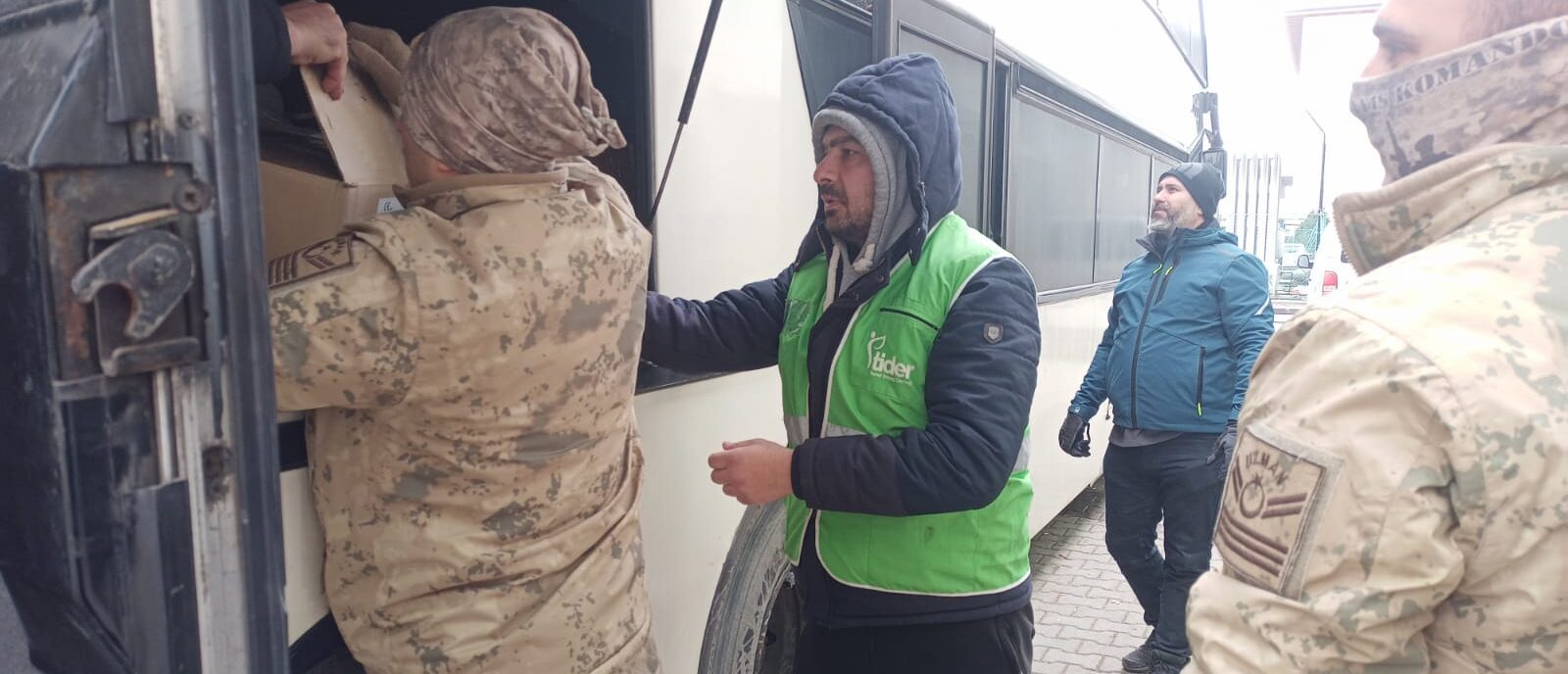Con frecuencia, cuando los clientes del Mercado de Apoyo de Adıyaman entran por la puerta, Elanur Çakır, en la caja, los recibe con una gran sonrisa. Si son nuevos en el Mercado de Apoyo, Elanur les muestra los largos pasillos, repletos de productos. Luego, les explica el proceso de pago, que se basa en un sistema de puntos en lugar de dinero.
Pero en ese momento, Pinar Sedefilik, quien resulta ser el cliente favorito de Elanur, pasa por allí. Ambos se toman un momento para ponerse al día.
"Me encanta su energía", dice Elanur. "Sonríe mucho, es habladora. Es una madre soltera fuerte".
El mercado se ha convertido en un recurso vital para muchos habitantes de Adıyaman afectados por el terremoto de magnitud 7,8 que azotó esta zona del país en 2023. Forma parte de la Asociación de Necesidades Básicas (TIDER), que apoya una red de bancos de alimentos que atiende a más de un millón de personas en 40 ciudades de Turquía. Cada banco de alimentos funciona como un supermercado, ofreciendo a sus clientes una amplia variedad de alimentos, productos de limpieza e higiene.
Elanur y su familia, en realidad, viven a solo tres casas de Pinar y sus hijas en Umut Kent K20, también conocida como Hope City, un conjunto de casas pequeñas y compactas construidas a partir de contenedores de transporte en el centro de Adıyaman.
“El terremoto fue muy duro para todos aquí”, dijo Elanur. “Perdimos mucho. Seguir con vida es como una segunda oportunidad”.
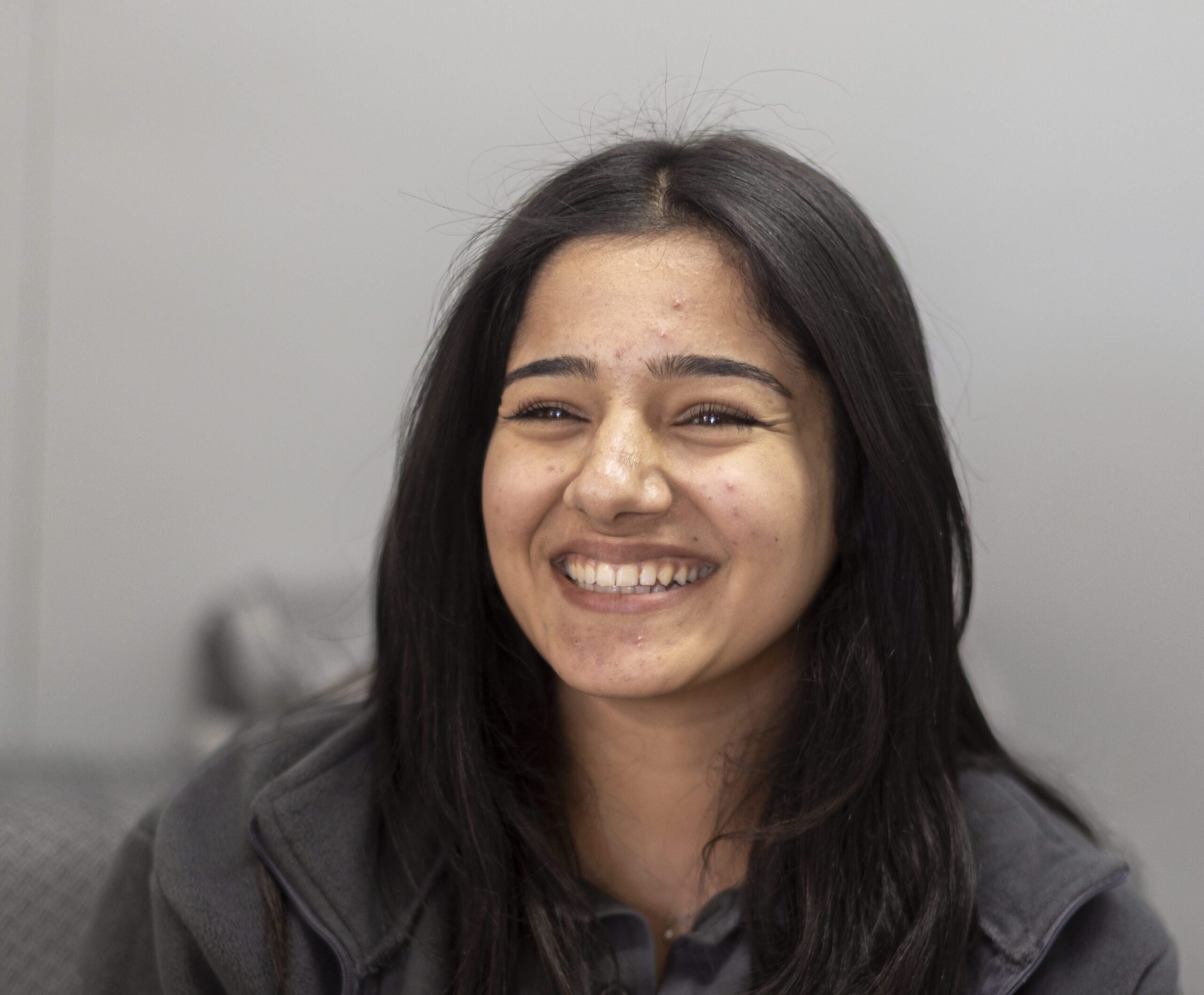
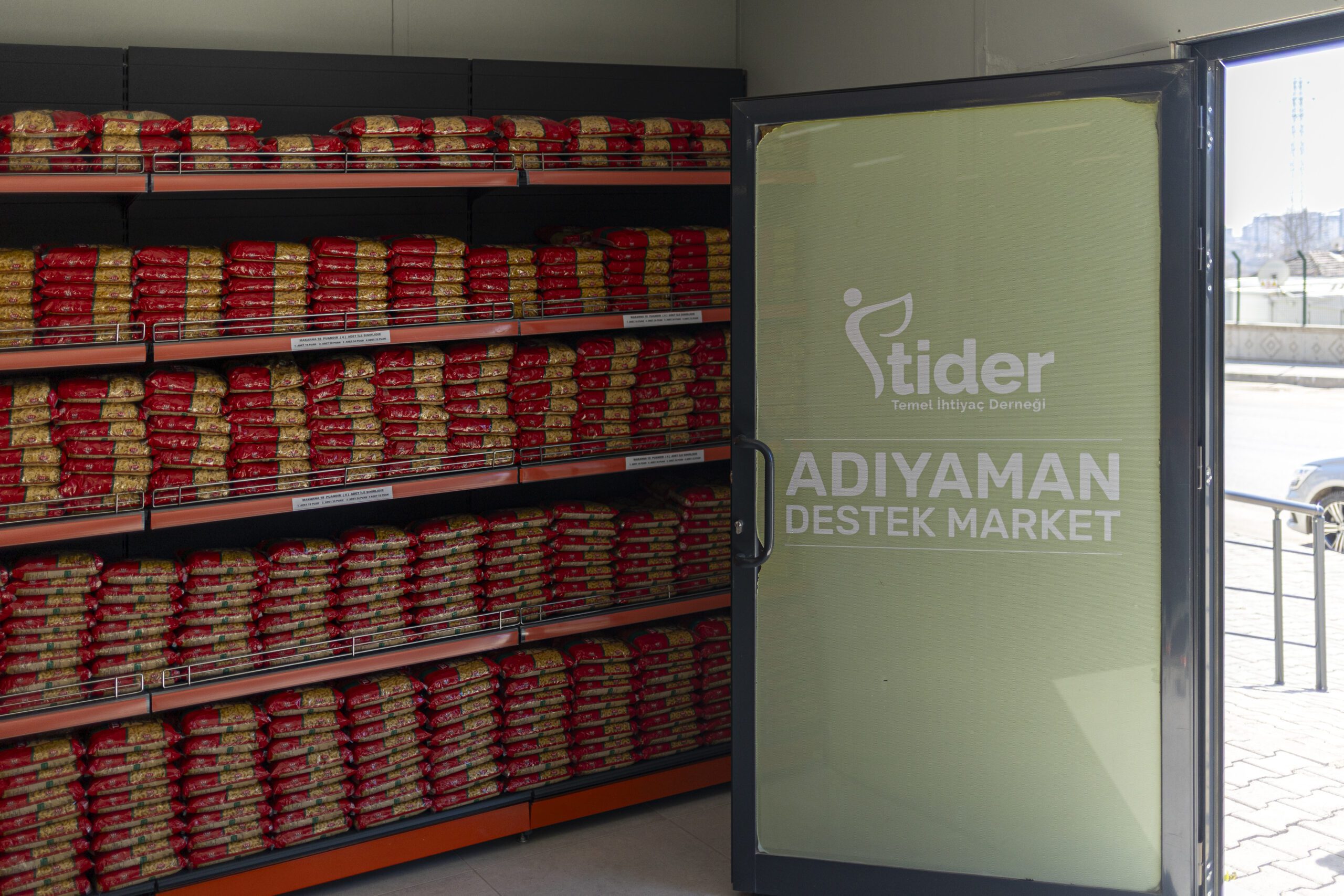
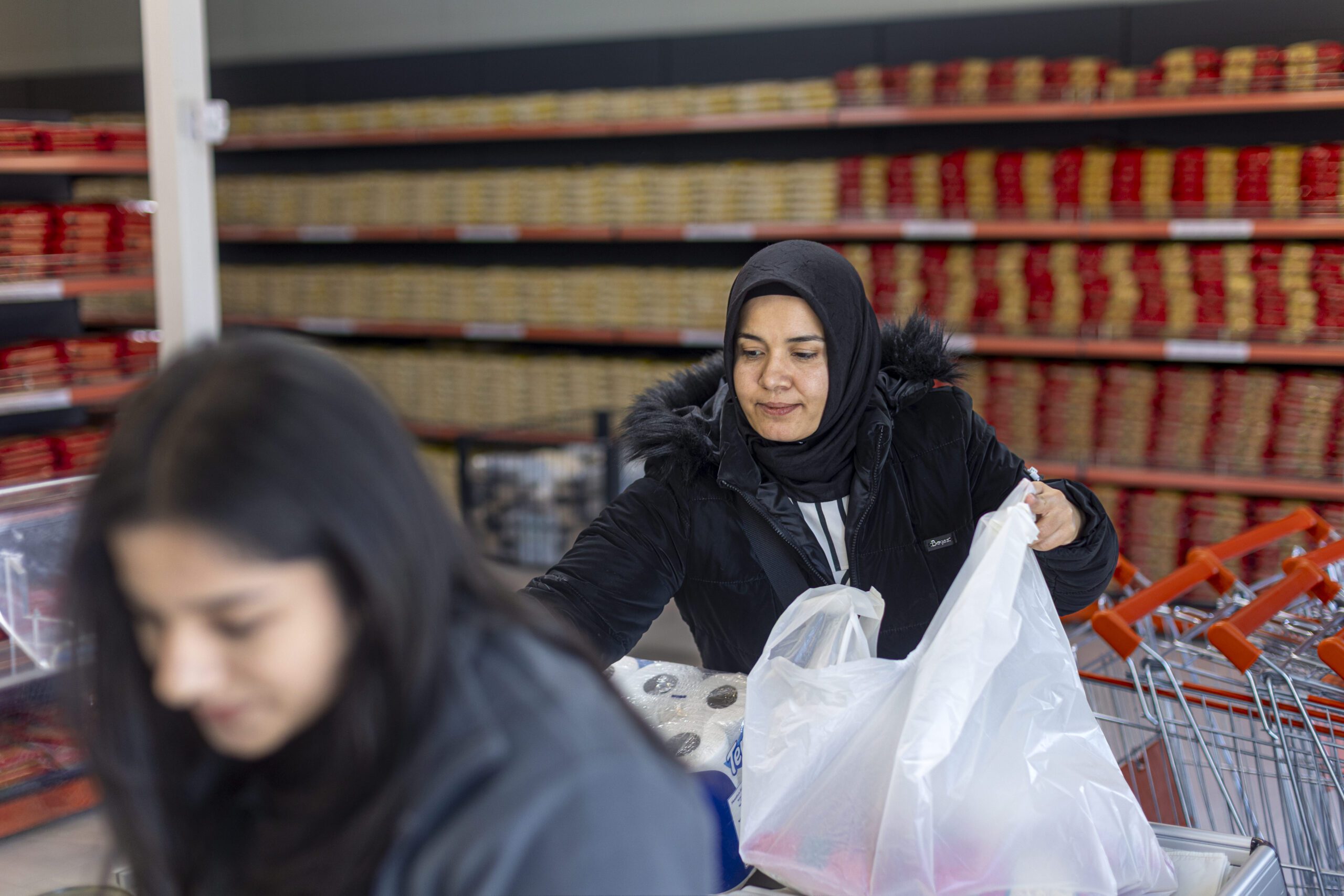
El terremoto que azotó el sureste de Turquía el 6 de febrero de 2023 duró poco más de un minuto, pero causó más de 50.000 muertes. En Adiyaman, 40% de edificios colapsadosY hoy, cerca de 120.000 de las 267.000 personas que viven allí viven en ciudades contenedor. Como muchos habitantes de la región, Elanur y Pinar perdieron a sus familiares, así como sus viviendas y empleos.
Cuando comenzó el terremoto, Elanur y su familia estaban en su apartamento del noveno piso. Se arrastraron por una ventana hasta el balcón, donde esperaron a que el temblor parara. Durante los diez días siguientes, vivieron en el jardín de su abuela, en una tienda de campaña improvisada hecha con plástico usado para jardinería.
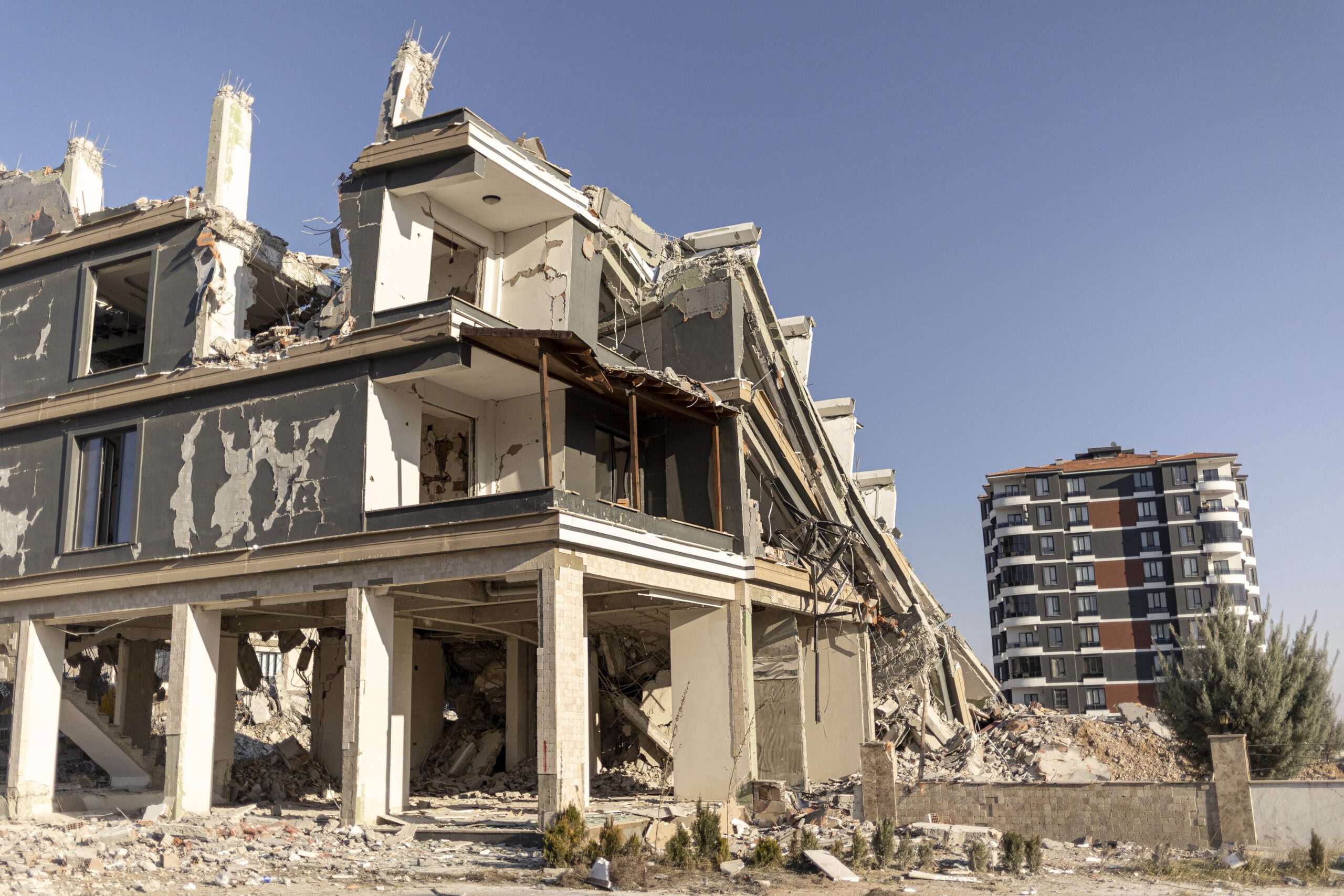
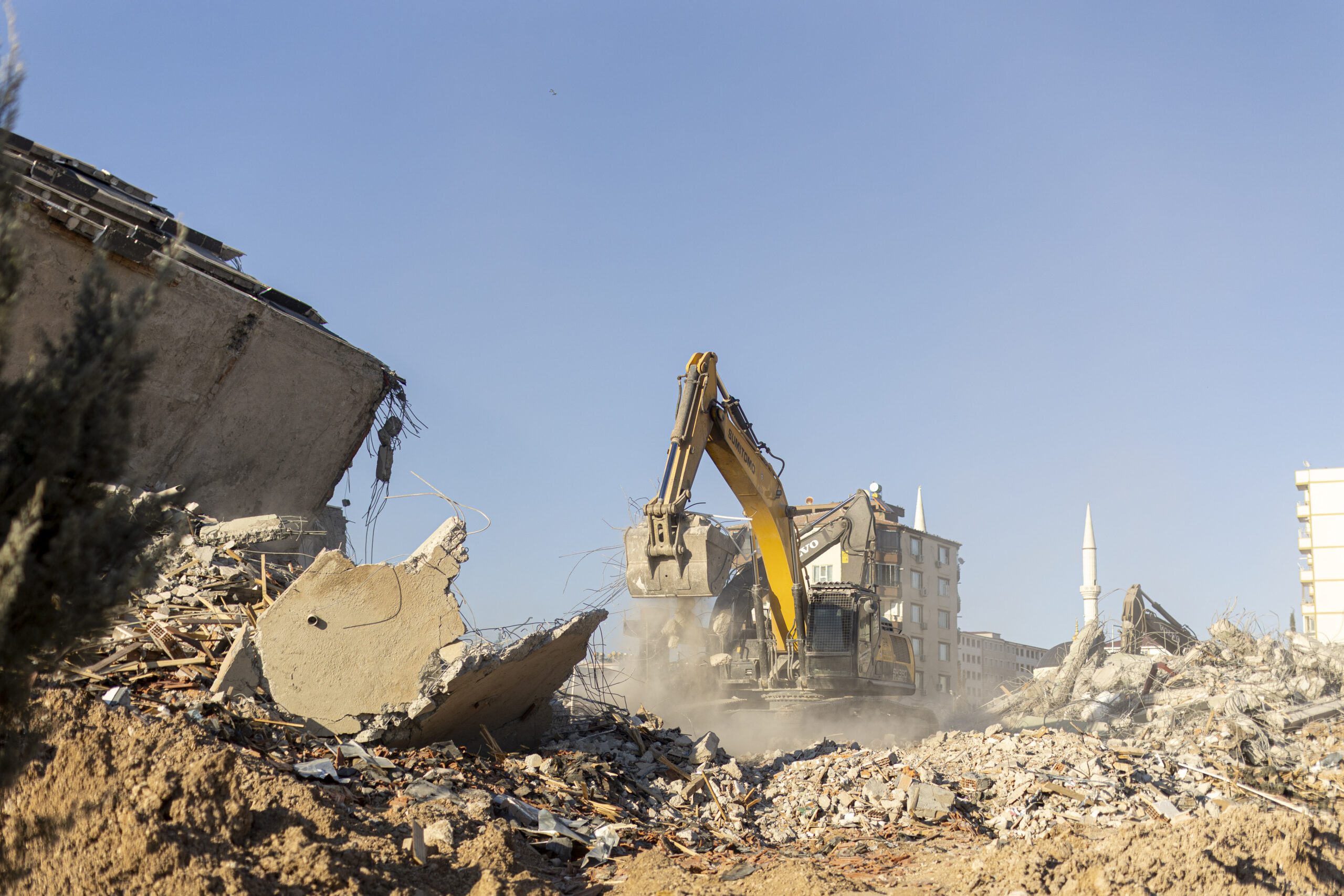
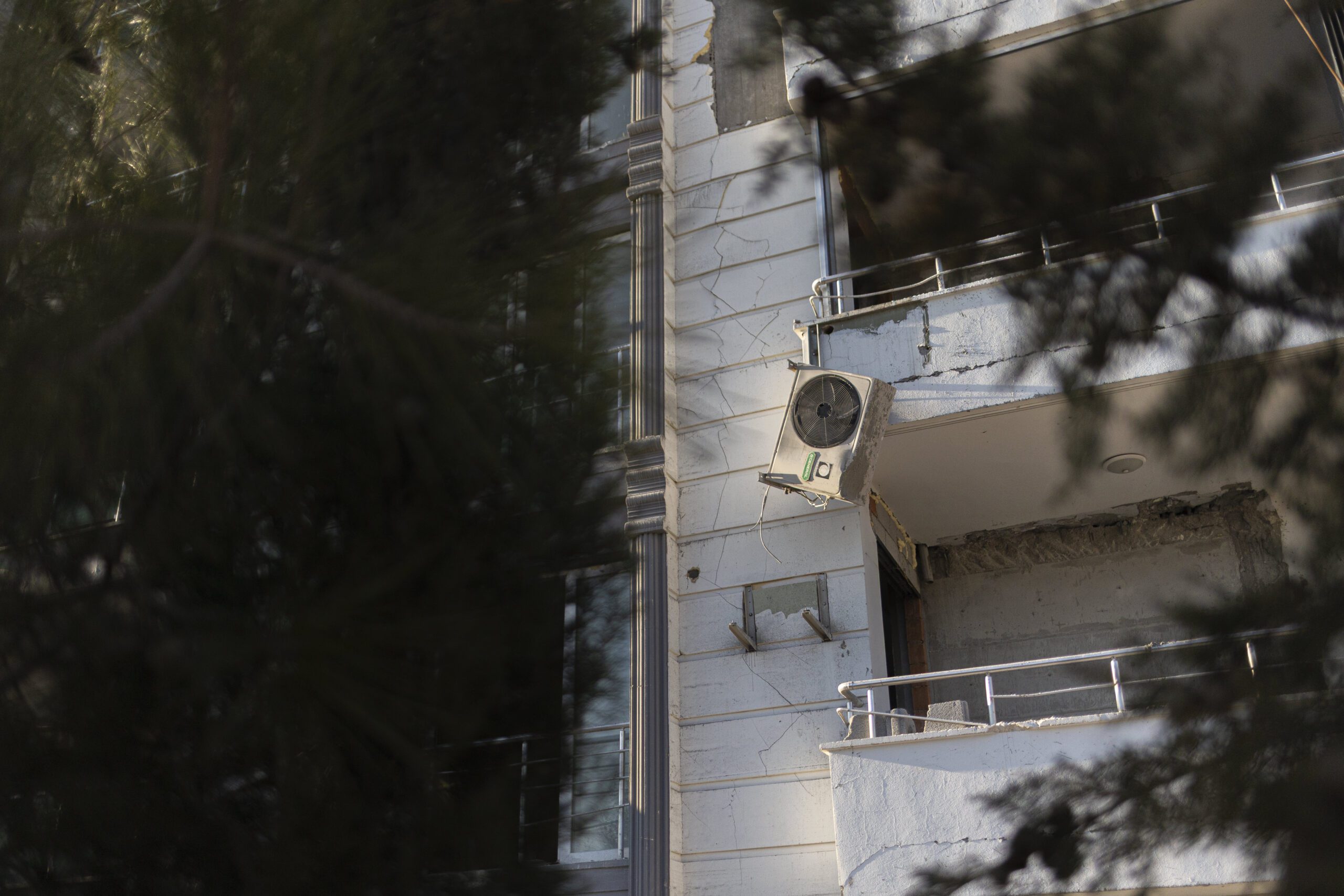
De igual manera, Pinar y sus hijas vivieron a la intemperie durante cuatro días y luego se mudaron a una tienda de campaña durante dos semanas más, lo que les proporcionó un refugio básico contra la lluvia constante. Ella comenta que, aunque gravemente afectada por el terremoto, Adiyaman no recibió tanta atención como otras ciudades. El personal de TIDER notó lo mismo.
“Vimos que Adiyaman estaba un poco perdido”, dijo Nil Tibukoğlu, gerente general de TIDER. “Nadie hablaba de la magnitud de la destrucción allí”.
Tras el terremoto, TIDER respondió inicialmente como miembro clave de la Plataforma de Desastres Afet, proporcionando a los equipos de rescate de la región alimentos y herramientas para una comunicación fiable. La Plataforma de Desastres es una coalición de 68 organizaciones sin fines de lucro comprometidas a brindar apoyo integral en situaciones de crisis, desde alimentos y alojamiento hasta servicios psicológicos e incluso rescate de mascotas. Cinco asociaciones, entre ellas TIDER, crearon la Plataforma de Desastres tras el terremoto de 2020 en Elâzığ.
Durante la primera semana, TIDER lideró las iniciativas de la Plataforma de Desastres para establecer almacenes regionales temporales en Gaziantep y Hatay. Desde allí, los equipos distribuyeron alimentos, mantas, tiendas de campaña y cualquier otro material que necesitaran los afectados y los voluntarios en diferentes ciudades.
TIDER recibió apoyo financiero y técnico de la Red Global de Bancos de Alimentos, lo que les permitió ampliar su capacidad para responder adecuadamente al desastre y ayudar a personas como Elanur y Pinar. "Recaudaron $600,000 para nosotros ese año", dijo Nil, "y eso superó con creces nuestro presupuesto". Con todos los recursos de TIDER enfocados en la respuesta al terremoto, GFN ayudó a la organización a cubrir sus costos operativos más esenciales, así como un programa de alimentación escolar que proporcionó almuerzos a más de 250 niños todos los días durante cuatro meses.
“Sin el apoyo de GFN, habría sido difícil pagar los salarios, el alquiler del almacén, la logística, los gastos de viaje, todo eso”, dijo Nil. “Nos mantuvo vivos. Cuando sabes que una comunidad [como GFN] te ayudará, para nosotros, fue una oportunidad de ser valientes”.
Al mismo tiempo que brindaban asistencia ante desastres con el apoyo de GFN, TIDER evaluó las necesidades de la región y planificó una ayuda sostenible a mediano y largo plazo para las comunidades afectadas por el terremoto. Y, como señaló el residente Pinar, el apoyo general en Adıyaman parecía insuficiente en comparación con las necesidades, por lo que Nil y su equipo idearon planes audaces.
Primero, TIDER estableció y operó un almacén temporal para distribuir alimentos y otros productos. Para abril de 2023, TIDER había colaborado con el gobierno local para asegurar una ubicación céntrica y segura para construir el Mercado de Apoyo de Adıyaman. Tenía que ser una obra nueva, ya que no quedaban edificios adecuados en pie. El proceso duró aproximadamente cinco meses, con la financiación de la empresa alimentaria Cargill para la construcción y dos años de operación.
El Mercado de Apoyo de Adıyaman abrió sus puertas el 31 de octubre de 2023, junto a una parada de autobús para facilitar el acceso. Actualmente, atiende a unas 2000 personas al mes. El mercado está diseñado para que sus compradores tengan una amplia gama de productos para elegir (actualmente unos 43), desde pasta, leche y productos de repostería hasta artículos de primera necesidad y ropa para bebés. El personal se comunica regularmente con sus clientes para ver si es necesario añadir algo al inventario del mercado.
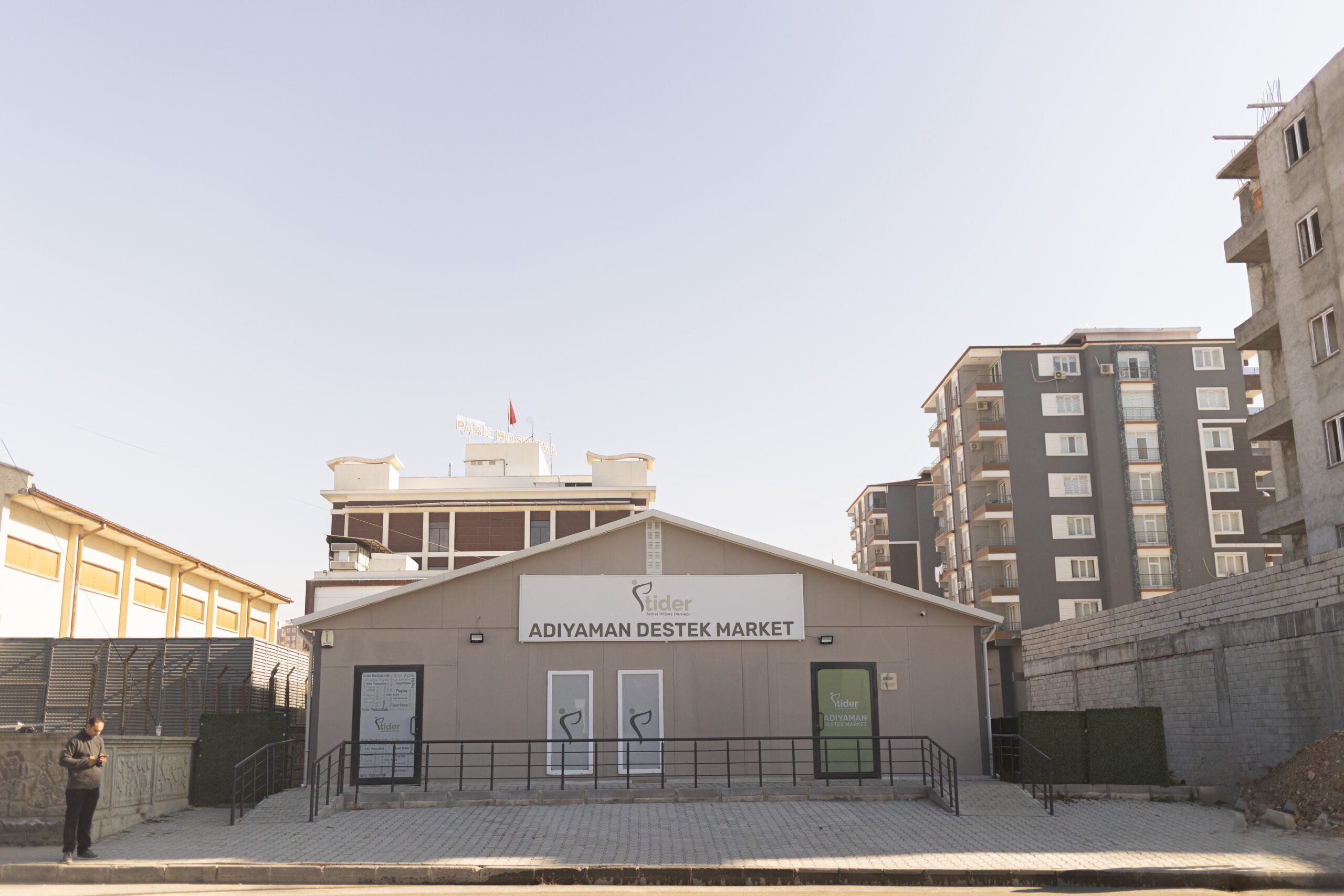
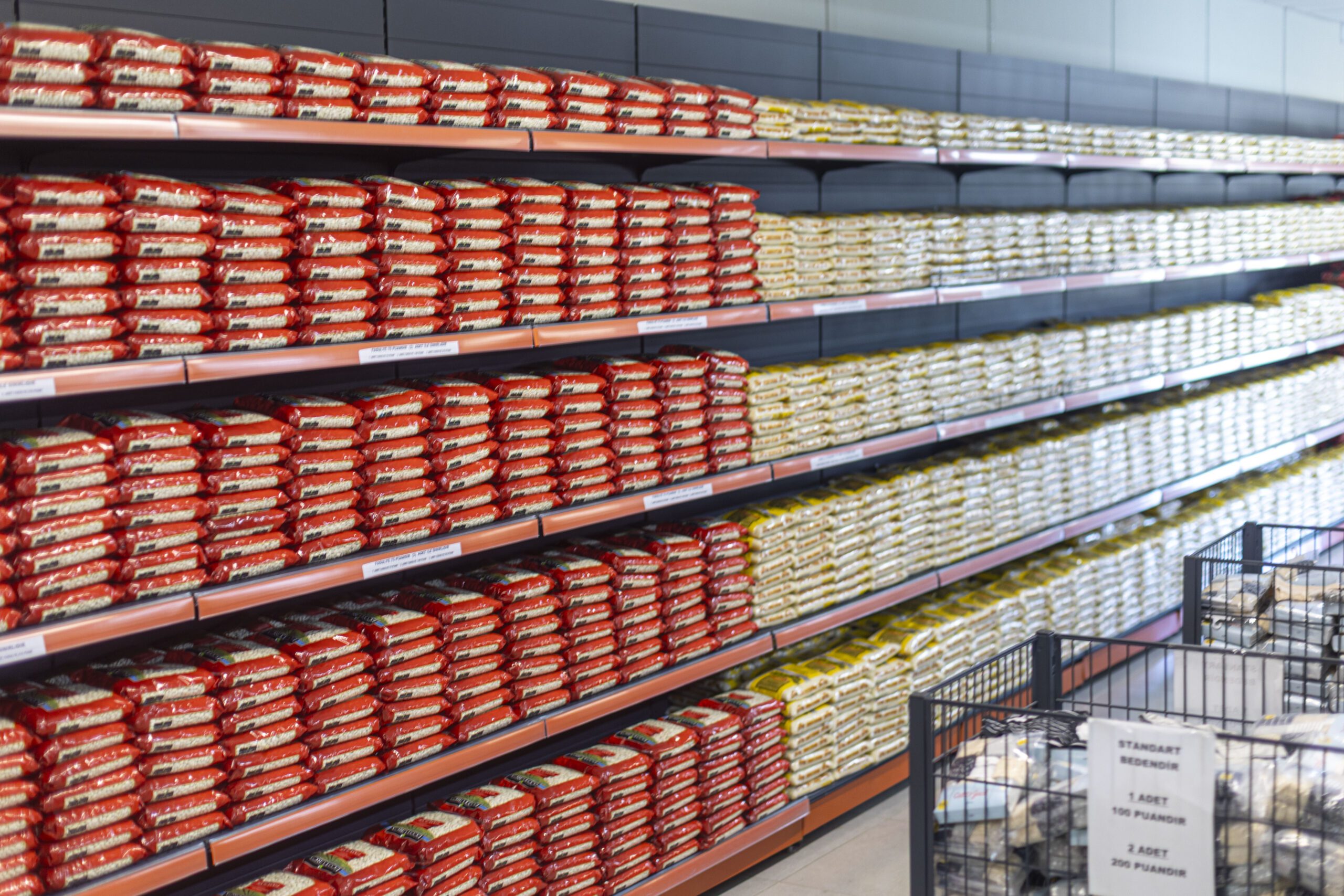
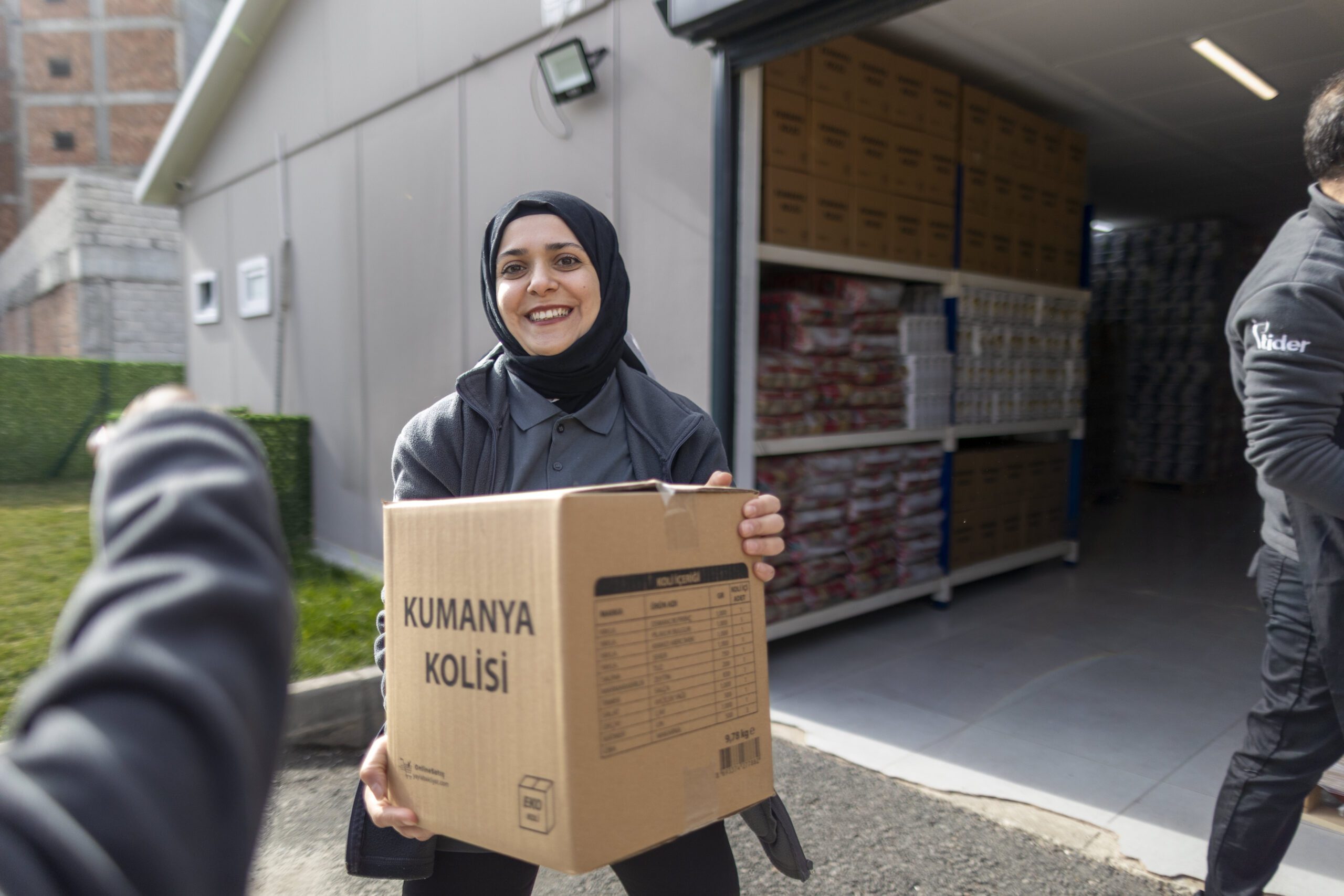
“Creemos que las personas a las que servimos en Turquía no siempre eligen su vida”, dijo Nil. “No eligen nada en la vida, ni dónde viven ni qué comen. Esta es la mejor manera de alimentarlos, porque pueden elegir por sí mismos. No es nuestra labor elegir lo que necesitan”.
Pinar dijo que el Mercado de Apoyo reduce a la mitad los gastos mensuales de compras de su hogar, lo que le permite comprar libros y otros útiles educativos para sus dos hijas, de 12 y 10 años.
“A mis hijos les encanta la pasta, así que compro un poco cada vez que vengo”, dice. “También compro artículos de higiene personal. Es un lugar céntrico y excelente para encontrar comida y otros productos, y me encanta lo que tienen aquí. Tienen todos los productos que realmente necesitamos, y nos ha sido de gran ayuda”.
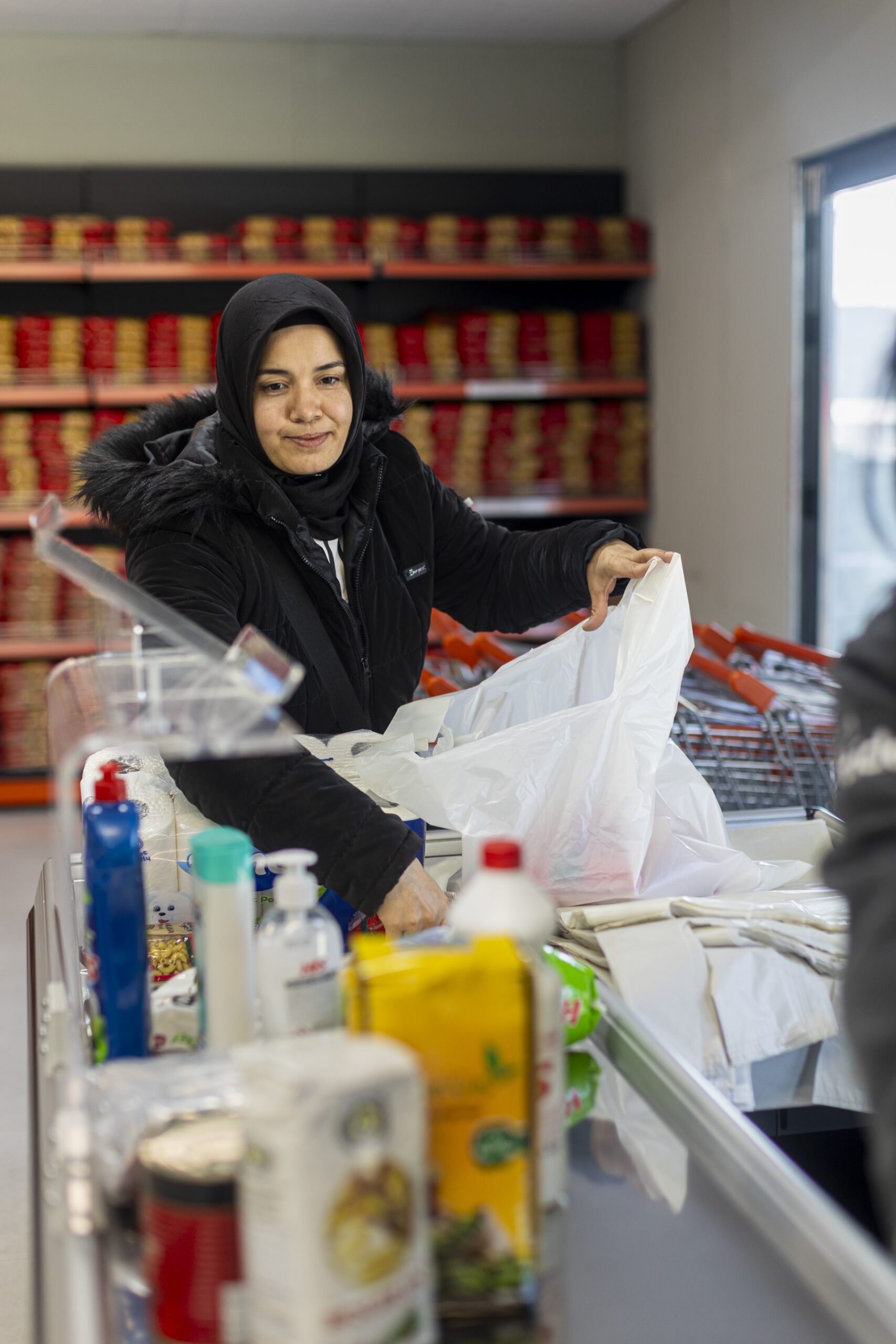
Para los residentes de Adıyaman, el Mercado de Apoyo también se ha convertido en un centro confiable donde pueden confiar en los miembros del personal para conectarlos con servicios de otras organizaciones.
Siempre decimos que, si la comunidad acepta un banco de alimentos, se convertirá en un centro comunitario. Ahora acuden a nuestro banco de alimentos para otras necesidades: si alguien necesita una silla de ruedas, si alguien necesita educación, si alguien necesita un producto diferente, dijo Nil.
A lo largo de los últimos dos años, los miembros del personal de TIDER y Adıyaman Support Market han escuchado de la comunidad sobre una necesidad específica en repetidas ocasiones.
“Adiyaman no solo sufrió daños físicos por el terremoto”, dijo Melike Çorlak, gerente del proyecto TIDER. “Además de perder sus hogares, la gente perdió sus empleos y cualquier perspectiva laboral. Muchos lugares de trabajo sufrieron daños importantes, por lo que la gente necesitaba suministros básicos, pero también necesitaba apoyo para encontrar trabajo”.
Incluso antes del terremoto de 2023, Elanur ya soportaba una pesada carga, sobre todo para alguien tan joven. En 2020, su madre, Hava Çakır, se cayó del balcón de su apartamento. Desde entonces, no ha podido trabajar, y la responsabilidad de ganar dinero para las necesidades de la familia recae sobre Elanur. Tenía solo 15 años cuando su madre sufrió el accidente.
Ahora, con 20 años, sigue cuidando de su madre y sus tres hermanos, de 15, 9 y 2 años, y ese cuidado incluye los gastos corrientes de sus dos hermanos menores. "No solo trabajo para mí", dijo. "Toda esta responsabilidad es mía".
En 2023, Elanur trabajó en una peluquería, pero ese empleo estable se vio truncado por el terremoto. Durante poco más de un año, la familia vivió en otra ciudad, donde Elanur encontró otro trabajo en una peluquería, pero no pagaba mucho ni ofrecía seguro médico. Su madre quería estar cerca de la familia, así que se mudaron de nuevo a Adıyaman, a la casa contenedor proporcionada por el gobierno en Hope City, a mediados de 2024. La familia de cinco ahora se las arregla con el espacio limitado, compartiendo una habitación con un sofá, dos literas y una cocineta, además de un pequeño baño.
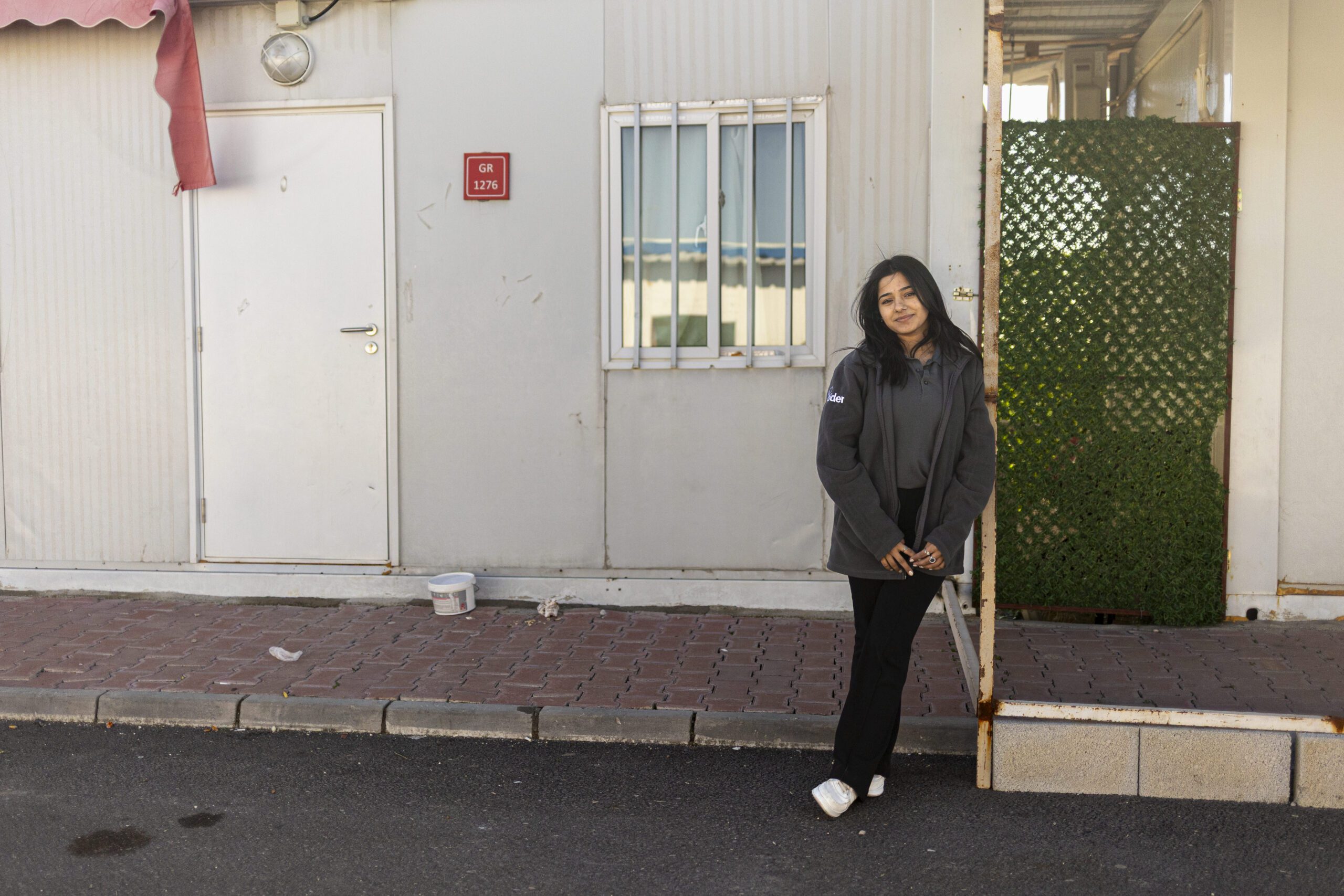
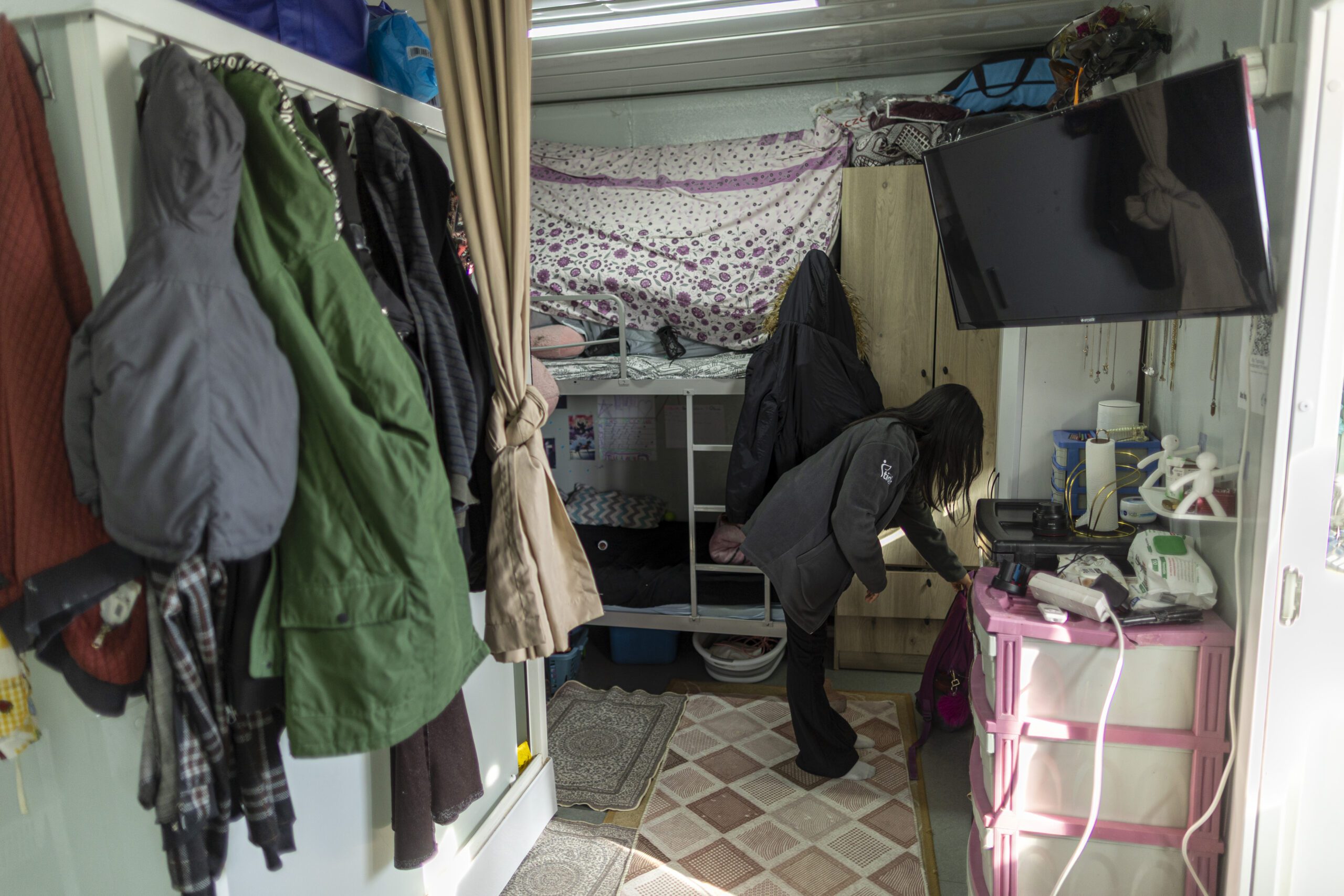
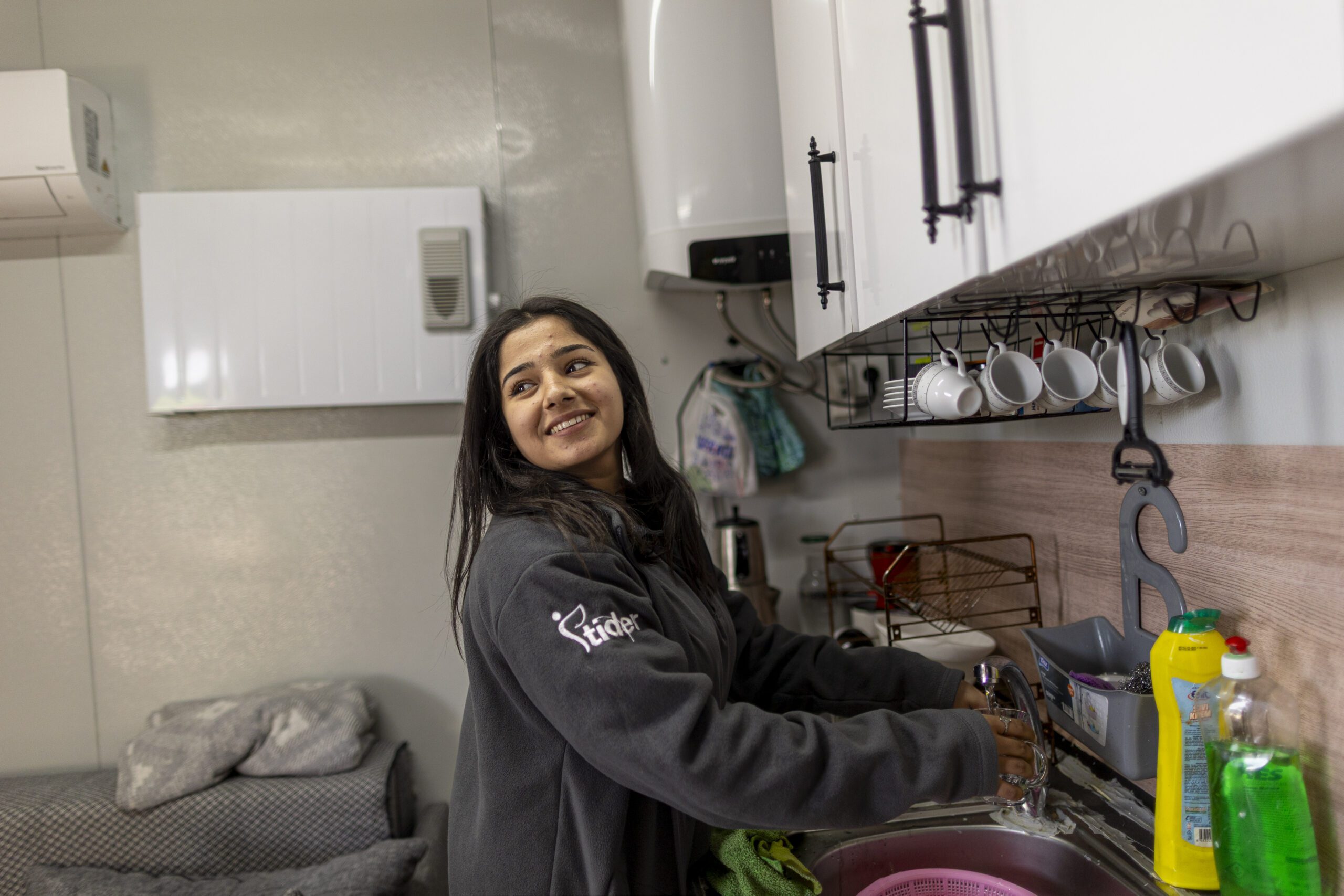
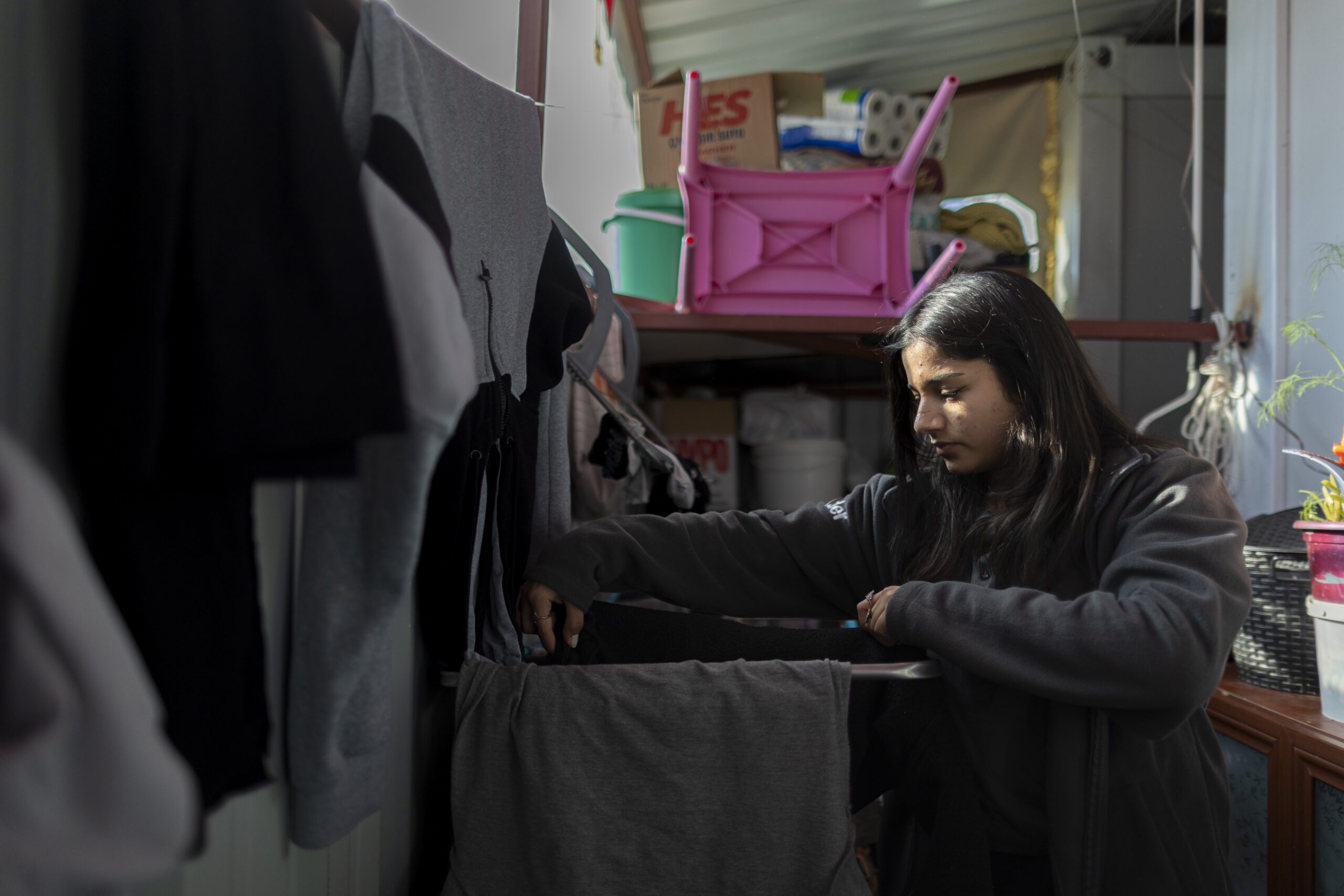
Fue en esa casa donde Elanur conoció al personal del Mercado de Apoyo de Adıyaman, quienes le explicaron los servicios del banco de alimentos. Tras conocer mejor su situación, el personal pensó que Elanur sería una buena opción para una iniciativa TIDER nueva en Adıyaman.
"Nuestro Soporte de RR.HH. programa es una plataforma digital desarrollada para garantizar que los beneficiarios de los bancos de alimentos puedan encontrar trabajo”, dijo Nil, quien supervisa el programa. Tanto los solicitantes de empleo como los empleadores potenciales pueden registrarse en Soporte de RR.HH. Sitio web. TIDER utiliza esas bases de datos para vincular ambas. Como parte del programa, TIDER ayuda a quienes buscan empleo con la preparación de currículums y entrevistas. Soporte de RR.HH. El programa comenzó en 2015 y ganó el primer Premio a la Innovación de GFN en 2017, y a fines de 2024 sus servicios se expandieron a Adıyaman.
“Tan pronto como abrimos el banco de alimentos, planeamos comenzar la Soporte de RR.HH. programa en Adıyaman, pero [todavía] no teníamos suficientes conexiones con las empresas”, dijo Nil. Ahora, la Cámara de Comercio de Adıyaman, compuesta por 47 empresas locales, es socio oficial de Soporte de RR.HH.TIDER se asegura de que haya muchos más socios por venir.
Y Elanur es el primer local Soporte de RR.HH. participante — ubicada en un puesto de personal en el Mercado de Apoyo Adıyaman de TIDER, que no solo le ofrece un salario estable y seguro médico sino también otros beneficios intangibles: tanto ella como su madre notan una mejora notable en su salud mental gracias a la estabilidad y tranquilidad que este trabajo aporta a su familia.
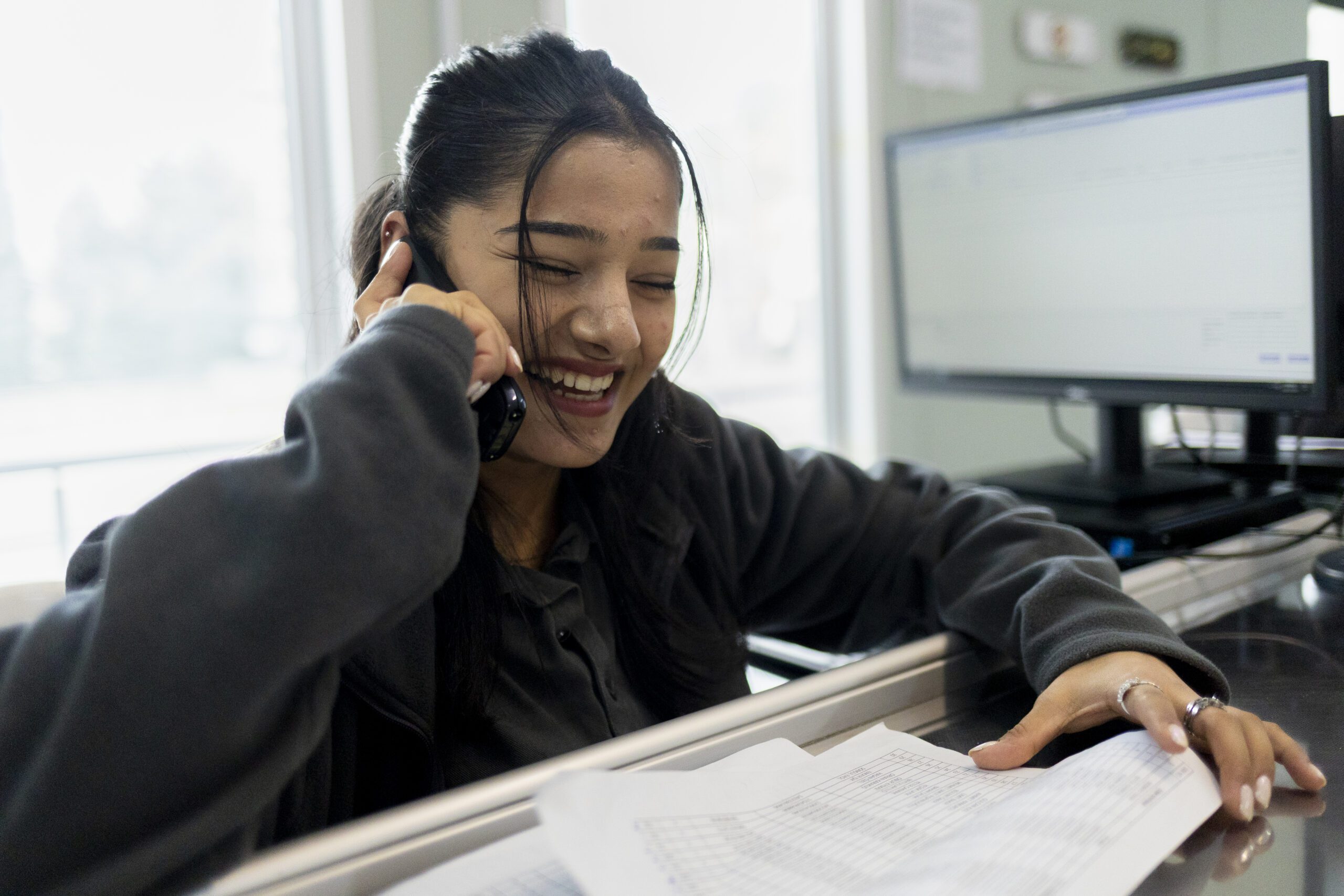
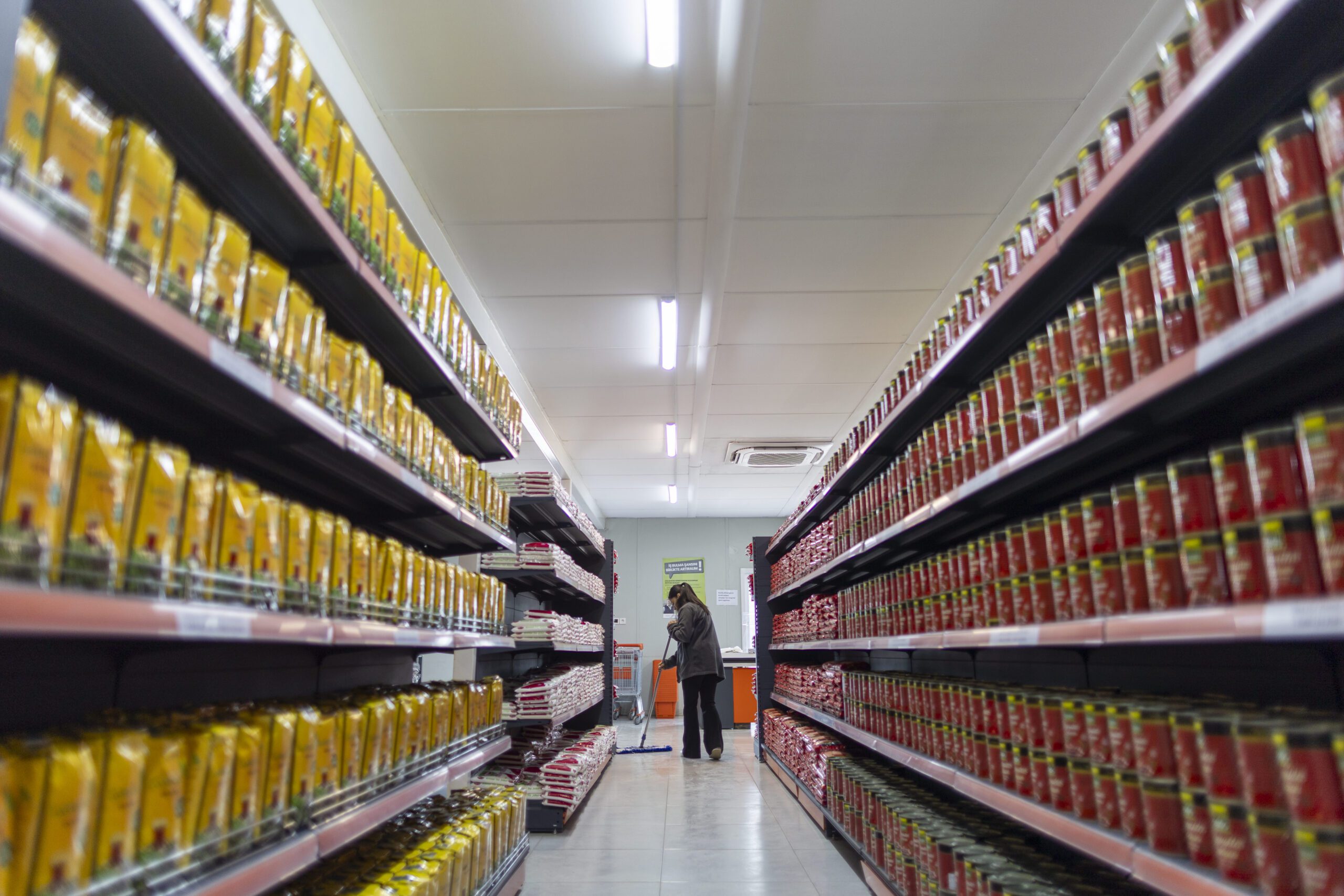
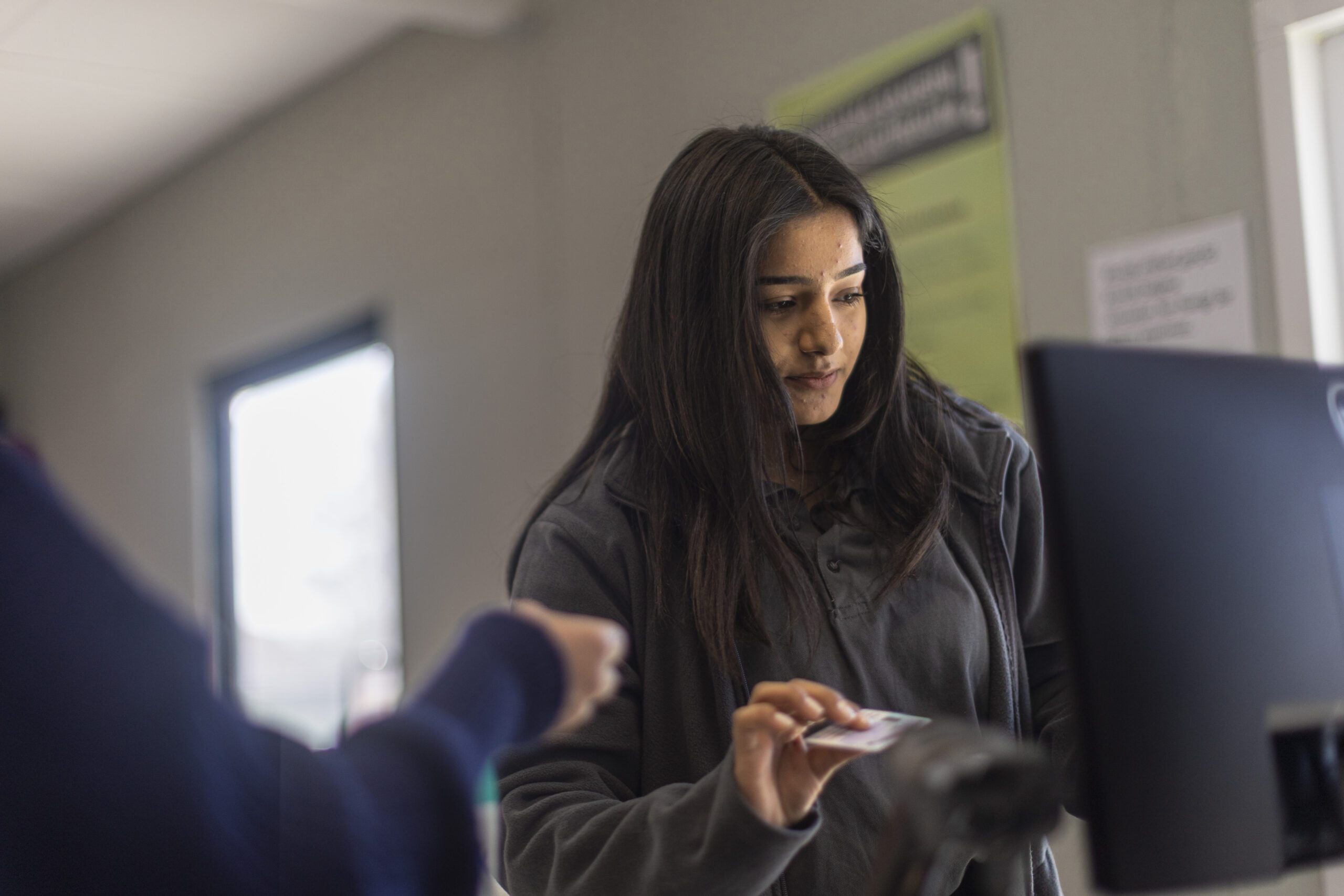
“Trabajar aquí realmente cambió muchas cosas en mi vida”, dijo Elanur. “Aquí he aprendido a tener confianza en mí misma y a sentirme fuerte”. Gracias a su trabajo, Elanur recibe desarrollo profesional y otras oportunidades educativas. Con el tiempo, le gustaría ir a la universidad y seguir una carrera en una organización sin fines de lucro.
Antes de TIDER, pensaba que algunas cosas eran imposibles. Que no podía lograrlo. Pero ahora mismo, no creo que nada sea imposible para mí.
Hoy en día, cuando los clientes del Mercado de Apoyo de Adıyaman entran por la puerta, Elanur todavía los recibe con una sonrisa desde la caja. Después de eso, podría dedicarse a perfeccionar sus currículums.
“Elanur no solo trabaja en el mercado, sino que también apoya el programa de Apoyo a Recursos Humanos”, dijo Melike. “Habla con las 1500 familias que participan en este proyecto”. El personal de TIDER está trabajando para expandir rápidamente el programa y conectar a las personas que no han podido encontrar trabajo con empleadores colaboradores, como Pinar, vecino de Elanur.
“Una vez que la gente se une a la Soporte de RR.HH. "Si se implementa el programa, ya no necesitan el Mercado de Apoyo", dijo Melike. "Nuestro objetivo es crear un sistema donde nadie necesite estos mercados".
